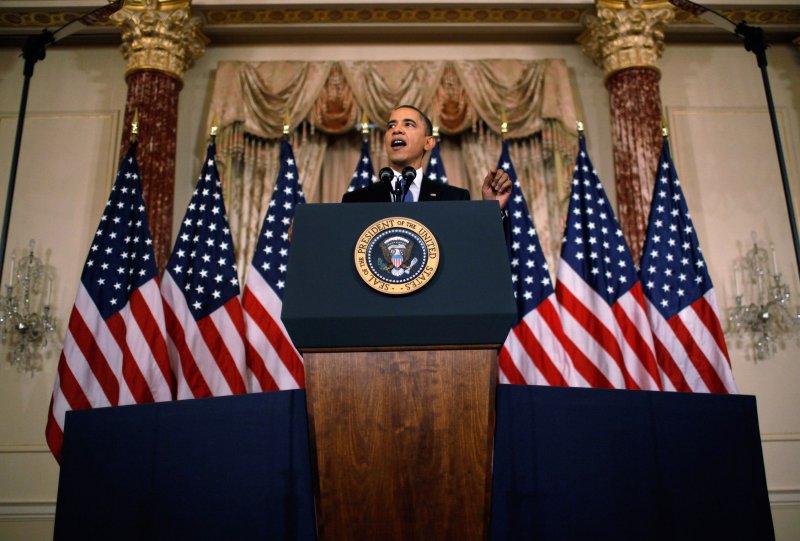1 of 7 | U.S. President Barack Obama delivers a speech on Mideast and North Africa policy in the Ben Franklin Room at the State Department May 19, 2011 in Washington, DC. Through the lens of the popular Middle East uprisings, the killing of Osama Bin Laden and the bloody crackdown on protesters by the Syrian government, Obama attempted to strike a balance between national security and the need for democratic reform in the Arab world. UPI/Chip Somodevilla/POOL |
License Photo
WASHINGTON, May 19 (UPI) -- President Obama, providing a sweeping look at the Middle East and North Africa, said Thursday promoting democratic reform in the region is a top priority.
"The status quo is not sustainable," Obama said in a speech delivered at the State Department.
Obama promised U.S. aid to nations as they embrace democracy while sharply condemning attacks on demonstrators, singling out Libya and Syria, and chastising regional ally Bahrain.
He also spoke of the need to restart Israeli-Palestinian peace talks, saying "everyone knows a lasting peace will involve two states and two peoples."
Beginning with the uprising Tunisia, "the shouts for human dignity are being heard though the region," Obama said, noting the non-violent protesters have accomplished more in six months than terrorists had in years.
Obama said the United States will "speak out for a set of core principles" that guided the country's response to the events over the past six months.
"The United States opposes the use of violence and repression against the people of the region. We support a set of universal rights … [We] support political and economic reform in the Middle East and North Africa that can meet the legitimate aspirations of ordinary people throughout the region," Obama said. "Our support for these principles is not a secondary interest -- today I am making it clear that it is a top priority … ."
The future of the United States is bound to the region in many ways, Obama said, focusing on "how we can respond in a way that advances our values and strengthens our security."
Obama outlined several economic proposals that would help secure emerging democratic governments, starting with Tunisia and Egypt, where uprisings drove long-time leaders from office.
Obama said he was asking the International Monetary Fund and the World Bank for a plan that would help stabilize the economies of Tunisia and Egypt. He also said he would work to relieve Egypt of as much as $1 billion in debt and guarantee $1 billion in borrowing. Obama said he was working with Congress to create enterprise funding to invest in Tunisia and Egypt.
Commitment to core values also "extends to places where change hasn't taken place," Obama said, notably Libya and Syria.
The United States can't be the world's policeman, but became involved in Libya to protect its citizens from strongman Moammar Gadhafi.
Regarding Syria, Obama said the Syrian people have "shown their courage" against a regime that has "resorted to murder and mass arrest." Syrian President Bashar Assad "can either lead a transit on [to democracy] or he can get out of the way," Obama said.
To be credible in pursuing its goals, the United States must acknowledge its allies sometimes don't act as U.S. officials would like, speaking of long-time U.S. ally Bahrain where government forces have used brute force to blunt pro-democracy protests.
"The only way forward is for the government and opposition to engage in a dialogue, and you can't have a real dialogue when parts of the peaceful opposition are in jail," Obama said. "The government must create the conditions for dialogue, and the opposition must participate to forge a just future for all Bahrainis."
Obama closed with a discussion of peace in the Middle East.
"Ultimately, it is up to Israelis and Palestinians to take action," Obama said. "No peace can be imposed upon them, nor can endless delay make the problem go away."
While the core issues of the conflict must be negotiated, the basis for negotiations -- a viable Palestine and a secure Israel -- is clear, Obama said.
"The United States believes that negotiations should result in two states, with permanent Palestinian borders with Israel, Jordan, and Egypt, and permanent Israeli borders with Palestine … based on the 1967 lines with mutually agreed swaps, so that secure and recognized borders are established for both states," Obama said.
Moving forward now issues of territory and security provides a foundation to resolve the "wrenching" issues of Jerusalem's future and the fate of Palestinian refugees, Obama said.
Countries across the Middle East and North Africa face a choice "between hate and hope, between the shackles of the past, and the promise of the future," he said.
"It's a choice that must be made by leaders and by people, and it's a choice that will define the future of a region that served as the cradle of civilization and a crucible of strife," Obama said.















